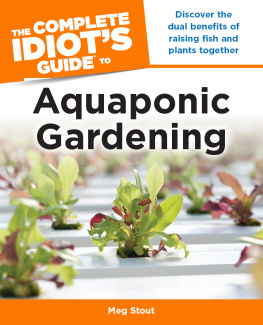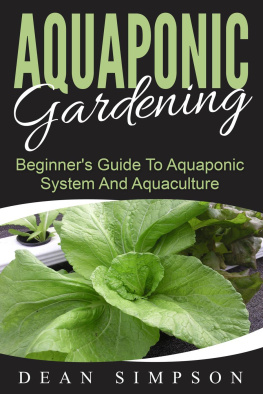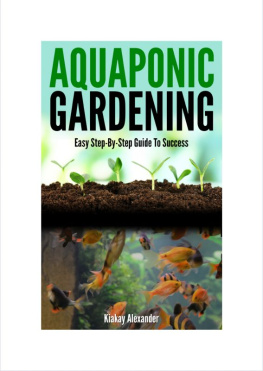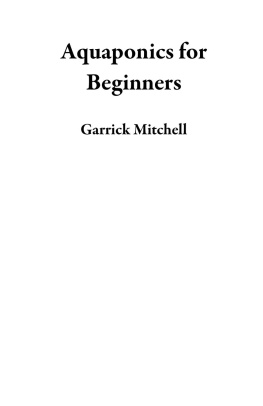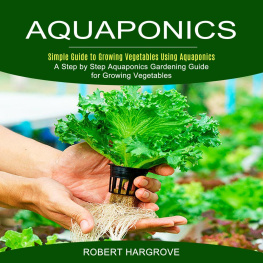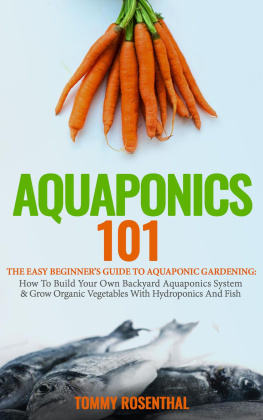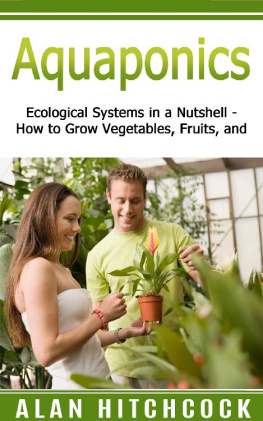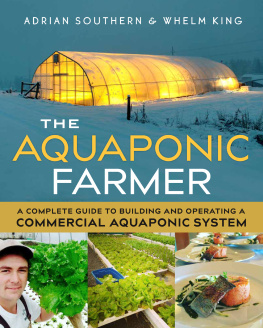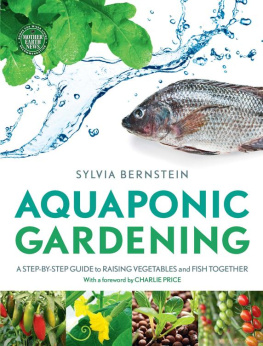
Aquaponic
Gardening
by Meg Stout

A member of Penguin Group (USA) Inc.
To my daughters and husband, who inspire me every day
ALPHA BOOKS
Published by Penguin Group (USA) Inc.
Penguin Group (USA) Inc., 375 Hudson Street, New York, New York 10014, USA Penguin Group (Canada), 90 Eglinton Avenue East, Suite 700, Toronto, Ontario M4P 2Y3, Canada (a division of Pearson Penguin Canada Inc.) Penguin Books Ltd., 80 Strand, London WC2R 0RL, England Penguin Ireland, 25 St. Stephens Green, Dublin 2, Ireland (a division of Penguin Books Ltd.) Penguin Group (Australia), 250 Camberwell Road, Camberwell, Victoria 3124, Australia (a division of Pearson Australia Group Pty. Ltd.) Penguin Books India Pvt. Ltd., 11 Community Centre, Panchsheel Park, New Delhi110 017, India Penguin Group (NZ), 67 Apollo Drive, Rosedale, North Shore, Auckland 1311, New Zealand (a division of Pearson New Zealand Ltd.) Penguin Books (South Africa) (Pty.) Ltd., 24 Sturdee Avenue, Rosebank, Johannesburg 2196, South Africa Penguin Books Ltd., Registered Offices: 80 Strand, London WC2R 0RL, England
Copyright 2013 by Meg Stout
All rights reserved. No part of this book may be reproduced, scanned, or distributed in any printed or electronic form without permission. Please do not participate in or encourage piracy of copyrighted materials in violation of the authors rights. Purchase only authorized editions. No patent liability is assumed with respect to the use of the information contained herein. Although every precaution has been taken in the preparation of this book, the publisher and author assume no responsibility for errors or omissions. Neither is any liability assumed for damages resulting from the use of information contained herein. For information, address Alpha Books, 800 East 96th Street, Indianapolis, IN 46240.
THE COMPLETE IDIOTS GUIDE TO and Design are registered trademarks of Penguin Group (USA) Inc.
ISBN: 978-1-61564-333-2
Library of Congress Catalog Card Number: 2012951749
15 14 13 8 7 6 5 4 3 2 1
Interpretation of the printing code: The rightmost number of the first series of numbers is the year of the books printing; the rightmost number of the second series of numbers is the number of the books printing. For example, a printing code of 13-1 shows that the first printing occurred in 2013.
Printed in the United States of America
Note: This publication contains the opinions and ideas of its author. It is intended to provide helpful and informative material on the subject matter covered. It is sold with the understanding that the author and publisher are not engaged in rendering professional services in the book. If the reader requires personal assistance or advice, a competent professional should be consulted.
The author and publisher specifically disclaim any responsibility for any liability, loss, or risk, personal or otherwise, which is incurred as a consequence, directly or indirectly, of the use and application of any of the contents of this book.
Most Alpha books are available at special quantity discounts for bulk purchases for sales promotions, premiums, fund-raising, or educational use. Special books, or book excerpts, can also be created to fit specific needs. For details, write: Special Markets, Alpha Books, 375 Hudson Street, New York, NY 10014.
| Publisher:Mike Sanders | Cover Designer:Kurt Owens |
| Executive Managing Editor:Billy Fields | Book Designers:William Thomas, Rebecca Batchelor |
| Senior Acquisitions Editor:Tom Stevens | Indexer:Heather McNeil |
| Development Editor:Lynn Northrup | Layout:Ayanna Lacey |
| Senior Production Editor:Janette Lynn | Proofreader:Amy Borrelli |
| Copy Editor:Jaime Julian Wagner |

Introduction
An aquaponic garden allows a gardener to avoid chemical fertilizers by using fish to provide nutrients for the plants. The plants grow in a soil-free environment, and the roots clean the water for the fish. Together, the fish and plants work together so the water can be recycled indefinitely. You only need to replace water that has evaporated, reducing your water bill.
Aquaponic gardens produce food naturally with much less water than a conventional garden. Aquaponics is becoming popular among people concerned about nutrition, avoiding artificial additives, and protecting the environment.
You can create an aquaponic garden almost anywhere you can bring together light and space using a footprint as small as a single square foot. And aquaponics is easy. Once youve created your system, you wont need to water or weed it, or even bend over. You will be able to grow more plants in less space than in a traditional garden, and your plants will grow faster and larger.
How I Stumbled Upon Aquaponics
Im an engineer/physicist, and I love elegant systems. I discovered aquaponics in the spring of 2010 while surfing the web. I tumbled upon Britta Rileys Windowfarms, small hydroponic gardens grown in a tower of recycled bottles hanging in a window.
I loved the idea of these small gardens, but I didnt fancy the idea of bottles of chemical nutrients in my home. Dumping the nutrient solution every couple of weeks as recommended was something I knew I would forget to do. The search for better plant nutrients led me to aquaponics: the idea of using a fish tank as my nutrient reservoir. Within days I had created my aquaponic Windowfarm.
I loved my two aquaponic Windowfarms made out of their recycled bottles. Fun as they were, though, they werent much more than edible conversation pieces.
When fall arrived, I decided to create a bigger aquaponic garden in my basement with 50- and 100-gallon stock tanks, heavy duty shelving, and fluorescent grow lights. With a bit more web research, I realized I could move my fish and plants outside.
Reduce Your Footprint
Aquaponic gardening gives you a chance to reduce your carbon footprint because your food doesnt have to travel hundreds of miles to get to your house. It reduces your water footprint because it recycles its own water. Aquaponics is also good for the environment because you arent adding fertilizer and chemicals that can pollute local water.
Even if you dont care about going green and reducing your footprint, aquaponics is a great way to grow food. Economic and health concerns are excellent reasons to adopt aquaponics.
Do It Yourselfor Not
In this book youll see a lot of DIY plans, but you can always decide that your time is worth more than the additional cost to buy a pre-made system. As aquaponics becomes more popular, I expect it will become possible to buy more and more components locally without having to pay for shipping. In the meantime, this book gives you enough information to create a system in a weekend using materials from local hardware and pet supply stores, if you want to.

